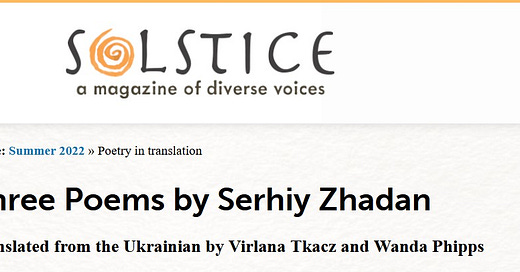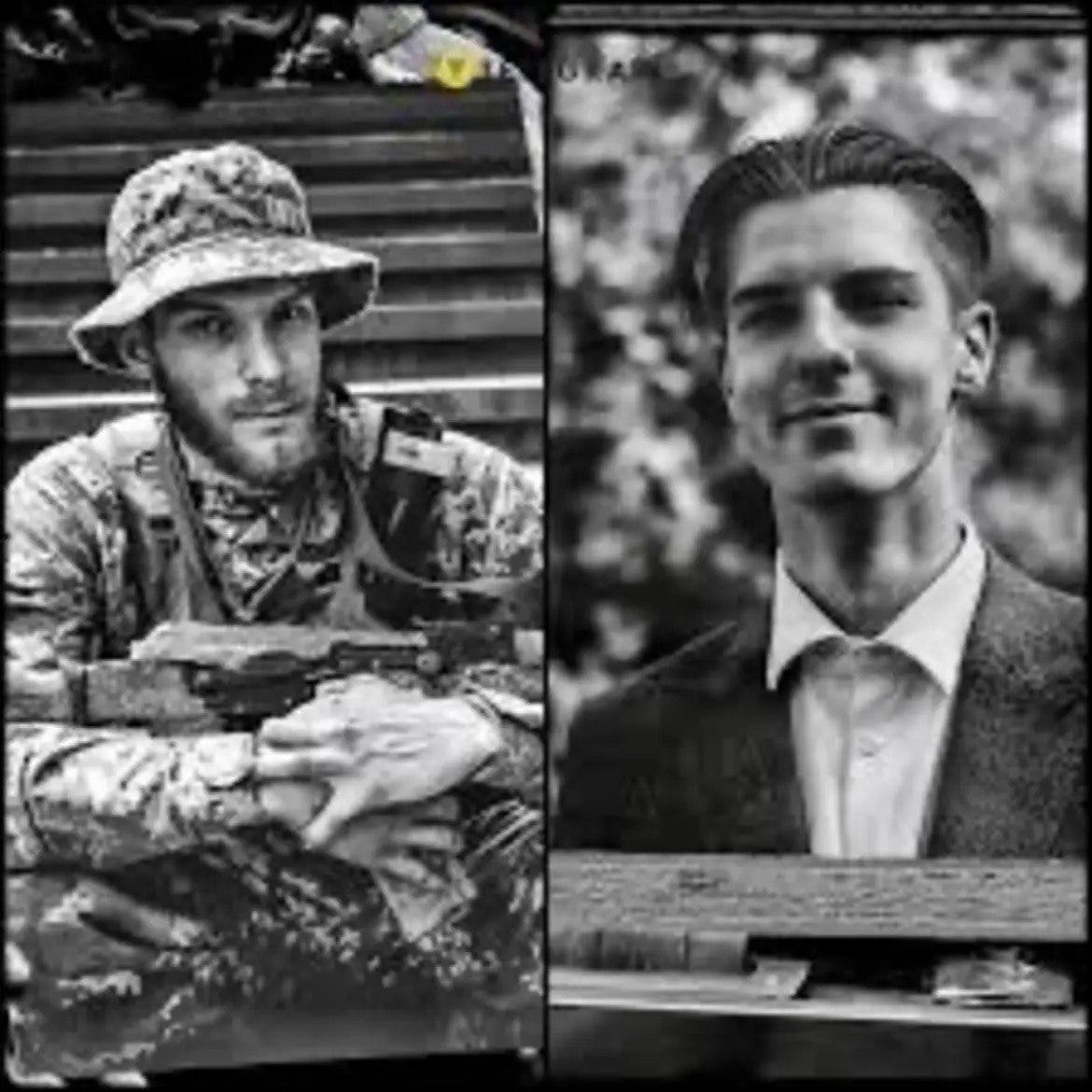Poetry is a matter of life, not just a matter of language. So said Lucille Clifton, the first African American poet laureate of Maryland. The Poetry Foundation describes Clifton’s work as emphasizing endurance and strength through adversity.
In my view, poetry is a matter of life AND a matter of language for Ukrainians.
Daniel Ofman writes in The World: Many Ukrainians are turning to poetry as a symbol of patriotism and resistance. Some say it’s a creative platform to express their feelings about the war or to stir a degree of national pride during wartime.
It is only natural that the land of Taras Shevchenko, the Ukrainian poet and artist who was imprisoned for his ideas about Ukrainian independence from Tsarist Russia, should see so many expressing themselves through poetry. Steve Moyer writes, “many … poets writing today in Ukraine…compose in free verse, relying more on repetition, word play, juxtaposition of images, and rhetorical devices than on traditional forms and meter to convey the harsh reality they’re witnessing.”
Reading the above commentary by Moyer, my friend Larysa Kuznietsova referred me to Serhiy Zhadan’s poems on harsh reality. Larysa describes Zhadan as “the exemplary contemporary Ukrainian poet, writer, singer, professor, soldier.”
“Zhadan is like modern Taras Shevchenko, as famous as Lina Kostenko,” says Larysa.
***
The talk about harsh reality and poetry reminds me of something I read by Charlotte Higgins.
For Ukrainians, poetry isn’t a luxury, it is a necessity during war. —Charlotte Higgins, The Guardian
Higgins writes: There is a Ukrainian government website that encourages members of the public to upload their work. “Every poem, every line, every word is part of Ukrainian history,” the site says. “We know for sure that wars end, but poetry does not.”
***
My friend Larysa Kuznietsova is a Ukrainian citizen in West Lafayette. Poetry is her only way to refine her thoughts. She writes her thoughts down quickly, as if they come from outside.
I asked her if poetry is her refuge (maybe a very cliched way of understanding on my part?)
“I can’t say it is a refuge,” said Larysa. “I don’t feel like there’s any refuge at all. I can just get rid of my thoughts this way. It is more like a catharsis, the purification or purgation of emotions primarily through art.”
“I feel better after having written a poem. I think it is self-repair.”
A line from one of Larysa’s earlier poems in an attempt to explain why Ukrainians write so much poetry during war time:
Poems aren’t written in peace of mind, but on the edge, where truth we find.
— Larysa Kuznietsova.
***
Причина цій війні
Біда у тім, що поки правлять сімдесятилітні ретрогради, -
За волю помирають молоді.
За волю, на своїй землі
Не ради мільйонів і посади.
Стареча жадоба - причина цій війні.
Причина цій війні - імперські амбіції,
Що розмивають сусідні границі.
Брати молоді, красиві, сміливі, розумні, -
Втрачений цвіт. Несправедливо і сумно.
Світла памʼять братам Ратушним.
— Larysa Kuznietsova, 6 Mar, 2025, West Lafayette
The cause of the war
(translated by Larysa using ChatGPT)
The trouble is, while old men reign,
The young must die in war and pain.
For freedom’s sake, upon their land,
Not for wealth or high command.
The greed of elders fuels the fight,
Their lust for power kills the light.
The cause of war—imperial schemes,
That shatter borders, crush our dreams.
Brave young brothers, bright and strong,
Lost too soon—this feels so wrong.
Blessed memory to the Ratushnyi brothers, Vasyl and Roman Ratushnyi.
— Larysa Kuznietsova, 6 Mar, 2025, West Lafayette
***
Багато землі
Вони тепер бачать так багато землі
І весь час знаходяться просто неба.
Ще на так давно мама казала: «Розвіртуалься. Тобі подихають свіжим повітрям треба.»
Здається, ще вчора взували фірмові кросівки, - як на хмаринці, пружинили на зустрічі з друзями пішки.
Тепер - у правій руці автомат замість комп‘ютерної мишки.
Чим вимірюється свобода і мрія?
Ціною життя без можливості зберегтися і змінить події.
«Ми, братику, вижили,
Напевно, ми дуже фартові.
Ти тер те яблуко, - цурався мікроб, коли накривало артою?»
Замість білосніжних кросівок - на ногах берці із пудом землі кожен.
Земля, за тебе платять
кров‘ю кольору панської рожі.
— Larysa Kuznietsova, 1 Apr, 2024, West Lafayette
A lot of soil (beneath the soles)
(Translated by Larysa using ChatGPT)
They now see lands so vast and wide,
Beneath the open sky abide.
Not long ago, their mother said,
*"Go offline, breathe fresh air instead."*
Just yesterday, in sneakers light,
They walked to meet their friends at night.
Now rifles rest in steady grips,
No mouse beneath their fingertips.
What is the cost of freedom’s way?
A life that cannot press replay.
*"We made it, brother—we're still here,
Guess fortune kept us safe and near.
Did you wipe that apple clean1,
When shells rained down in deadly sheen?"*
No sneakers now—just heavy boots,
With soil that clings and never loosens.
This land is paid in blood so deep,
The red of roses that cannot heal.
— Larysa Kuznietsova, 1 Apr, 2024, West Lafayette
***
In April of 2023, I wrote about the death of Kostyantyn Semchynskyy, a professor of political science who joined the Ukrainian army voluntarily to fight the Russian invaders. He was killed in battle and received a hero’s funeral. Вічная Пам’ять (Vichnaya Pamyat) — Eternal Memory!
Larysa created this video tribute in memory of Kostyantyn Semchynskyy, who was killed on March 19, 2023. The narrator is Anna, age 10.
As ‘Ukraine Matters’ is a freely available newsletter to all who access it or subscribe to it, I periodically highlight various fundraising efforts through it. Today, I asked Larysa to suggest an organization close to her heart. Her response: United24 — The Initiative of the President of Ukraine. Thank you in advance for any gift contributions you might make directly to United24.
***
In December 2024, I wrote about my zemlyak and friend, Mridula Ghosh, who continues to live and work in Kyiv despite the war. Amidst the darkness and abyss and sirens, Mridula’s translations of Shevchenko’s poetry into the Bengali language has recently been published. This is the first translation of Shevchenko’s verses from the Ukrainian original into a South Asian language. An in-depth introductory essay is in English. For more details on the publication and some photographs please visit Mridula’s facebook page.
***
Taras Shevchenko. Soldiers. Young soldiers. Deaths of soldiers. Artists, poets, angels at heart. All of these themes were sadly brought together in a strange way by the cruelty of a senseless aggression of a mad imperial power. On March 9, 2025, a Ukrainian sculptor, also a soldier, a namesake of Taras Shevchenko, was killed in action. He was only 25. As an employee of Tuzly Lagoons National Nature Park, sculptor Shevchenko created a monument to the Dalmatian pelican, a vulnerable species listed in Ukraine’s Red Data Book.
March 9 is the birthday of poet Taras Shevchenko, who was born in 1814.
***
Here is a gift article link to a NYT article ‘Battle-Hardened Poets Fuel a Literary Revival in Ukraine.’
“With verses that capture the raw emotions of the war and resonate deeply with the population, Ukrainian poets have emerged as some of the country’s most influential voices.”
The worry about whether the apple is clean when being attacked is an example of Ukrainian humor as an antidote for stress.








Let me recommend Poetry Gives Us Special Knowledge: https://aworldeofwordes.substack.com/p/poetry-gives-us-special-knowledge?r=5d7dmx.